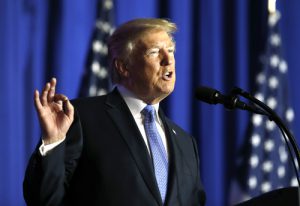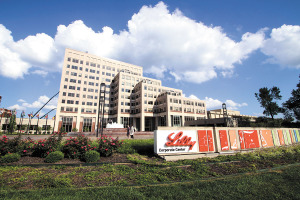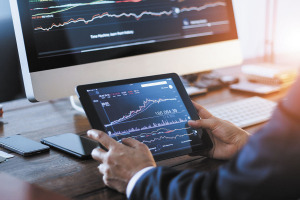
Stock market on midday pace for worst session since 2022
Worries are rising the Federal Reserve might have kept its main interest rate at a two-decade high for too long.

Worries are rising the Federal Reserve might have kept its main interest rate at a two-decade high for too long.

The spotlight is turning to Indianapolis-based Eli Lilly and Co. as the next possible member of the so-called “Trillion-Dollar Club,” based on the drugmaker’s climbing stock price and swelling demand for its treatments for diabetes, obesity and other diseases.

Unlike other record-setting days, Tuesday’s came after a widespread rally where nearly nine out of every 10 stocks in the S&P 500 rose, instead of just the handful of influential Big Tech stocks.
Early last week, Nvidia overtook Microsoft as Wall Street’s most valuable public company. Then it fell 13% over three days, its worst such stretch since 2022.

The company’s journey to be one of the most prominent players in AI has produced some eye-popping numbers. Here’s a look:

Stocks have continued to hold up despite the worst inflation in decades, the punishing effects of high interest rates and worries about a recession that seemed inevitable but hasn’t arrived.

More worries about inflation and interest rates staying high knocked U.S. stocks lower on Tuesday, as the market closed out its worst month since September.

Before trading began, Trump Media had a market value of about $6.8 billion, a figure that will rise significantly if the early gains in the shares hold.

The financial markets cheered the message Wednesday from Jerome Powell and the Federal Reserve, with traders sending the Dow Jones industrial average surging 1%, to another all-time high.

In the past 52 weeks, shares have set new records almost every week, due to investor eagerness over the company’s new drugs for obesity and diabetes, two health conditions that plague America, along with other drugs in the pipeline.

Ancora Holdings Group LLC said the animal health company has underperformed its peers and destroyed billions of dollars of shareholder value.

Shares in the Indianapolis-based drugmaker are setting new records almost every day, due to investor excitement over the company’s new drugs for obesity and diabetes, two health conditions that plague America.

The markets have been on a celebratory tear in recent weeks, as signs pile up that the Federal Reserve may be done raising interest rates.

Most of Indiana’s 14 publicly traded banks have seen a significant drop in stock prices at some point this year, in some cases falling more than 50% from their Jan. 3 prices, the first trading day of the year.

The company was formed only three years ago and went public on Sept. 29 in an initial public offering that raised $5.3 million after expenses.
The financial services powerhouse, which has major operations in Indianapolis, did not specify how many positions would be eliminated—but suggested that the layoffs will take place in the coming months.

The pharmaceutical company has launched 20 drugs in the past decade to treat diseases from arthritis and psoriasis to diabetes and cancer. In recent months, Lilly has overtaken every competitor to become the most valuable drugmaker in the world.

S&P recently updated its approach to incorporating environmental, social and governance considerations into credit ratings, ditching an alphanumerical scale it introduced in 2021 and instead going back to relying only on text descriptions.

Emmis Corp. CEO Jeff Smulyan says he believes his fourth pitch to take the Indianapolis-based media company private will be successful.
Many analysts believe margins hit bottom in the second quarter, and they’re forecasting a recovery in the second half. Others are less optimistic.